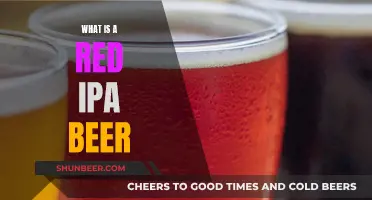
Drinking an IPA beer can cause bloating due to several reasons. Beer is a carbonated beverage with a high carbohydrate content, and the fermentation process can produce gas in the digestive system, leading to bloating and discomfort. Additionally, the carbon dioxide in beer can build up in the stomach, causing bloating if it is not released during pouring. Some people may also have a beer allergy or intolerance, with symptoms such as extreme bloating, discomfort, or an upset stomach. To reduce bloating, it is recommended to pour beer into a glass at a 45-degree angle, allowing the carbonation to escape, and to stay hydrated by drinking water before, during, and after consuming alcohol.
What You'll Learn

Beer and carbon dioxide
Carbon dioxide (CO2) is a natural byproduct of the fermentation process in beer production. Yeast converts the sugars in the wort to alcohol and CO2. This gas is what gives beer its "fizz" or "condition". The solubility of CO2 in beer increases as the temperature decreases, so a higher concentration of CO2 can be dissolved into the beer by cooling it. This is why beers are often served chilled.
The CO2 in beer is responsible for the tingle on your tongue and contributes to the formation of the foam head. The foam is largely a result of CO2 being released from the liquid, and it also helps to retain the beer's aroma. The release of CO2 from the liquid can be enhanced by scratching or etching the base of the glass, creating more sites for gas evolution.
The high concentration of CO2 in beer can also lead to bloating, especially if the beer is consumed directly from the can or bottle. When beer is poured into a glass and allowed to foam, some of the CO2 is released, reducing the amount that ends up in your stomach. However, if the beer is poured incorrectly, with the glass tilted until the beer runs out, the CO2 can remain dissolved. This can lead to a release of gas inside your stomach, causing bloating.
To avoid bloating, it is recommended to pour beer into a glass at a 45-degree angle and then straighten the glass as it is filled. This helps release some of the CO2 and creates a nice foam head. Additionally, drinking from a glass allows you to see and control the amount of foam, which can help prevent excessive bloating.
While bloating can be a normal reaction to the high levels of CO2 in beer, it can also be a sign of a beer intolerance or allergy. If you experience extreme bloating, discomfort, or other allergic reactions such as inflammation, anxiety, or diarrhoea after drinking beer, it may be a sign that your body doesn't tolerate it well. In such cases, it is advisable to consult a doctor or try alternative beverages like cider or wine.
Weight Watchers and Beer: How Many Points in an IPA?
You may want to see also

Beer and dehydration
Alcohol interferes with the body's ability to retain water, resulting in increased urination. This is because alcohol suppresses the production of a hormone called anti-diuretic hormone (ADH), which regulates sodium balance and urination. With decreased ADH levels, the kidneys produce more urine, leading to a higher fluid output than the amount of beer consumed. This diuretic effect of alcohol contributes to dehydration.
The carbonation in beer also plays a role in dehydration. Beer contains carbon dioxide, which can be released in the stomach when consumed without proper pouring or when drunk directly from the can or bottle. This release of carbon dioxide can lead to bloating and discomfort. Pouring beer into a glass at a 45-degree angle and allowing it to foam helps release some of the carbon dioxide, reducing its expansion in the stomach.
Additionally, beer can cause inflammation in the gut and increase the risk of liver disease with consistent drinking. It passes through the body quickly, leading to increased irritation in the intestines. Dehydration exacerbates these effects, and proper rehydration is essential to restore fluid balance.
To minimize dehydration, it is recommended to drink water along with beer and to ensure adequate fluid intake before and after consuming alcohol. Light or moderate beer consumption may not cause significant dehydration, but excessive drinking can lead to fluid imbalance and related health issues.
Transform Budweiser to IPA: Hops, Yeast, and Time
You may want to see also

Beer and digestion
Beer is a beloved beverage for many, but it can also be a source of discomfort, especially when it comes to digestion. One of the most common issues associated with beer consumption is bloating. So, why does beer make you bloat? Well, there are several reasons, and it's important to understand the causes to find ways to mitigate this unpleasant side effect.
Carbon Dioxide
One of the primary culprits of beer bloat is carbon dioxide. During the fermentation process, beer produces a significant amount of carbon dioxide, which is trapped in the liquid. When you drink beer, especially directly from the can or bottle, the carbon dioxide has nowhere to escape but into your stomach. As a result, it builds up and causes that bloated feeling.
The solution? Proper pouring techniques. Beer experts, such as Max Bakker, recommend always pouring beer into a glass. By tilting the glass at a 45-degree angle and then straightening it as the beer settles, you force some of the carbon dioxide to release from the beer into the air, rather than into your stomach. This simple technique can significantly reduce the bloating effect.
Dehydration
Alcohol, in general, is known to cause dehydration, and beer is no exception. As a diuretic, beer increases urine production, leading to fluid loss. To compensate, the body retains water, resulting in swelling and puffiness, often referred to as a "beer belly." This dehydration-induced bloating can be prevented by staying properly hydrated before, during, and after drinking beer. Drinking water and eating a balanced meal before drinking can help slow down alcohol absorption and reduce the risk of bloating.
Carbohydrates and Fermentation
Beer is also high in carbohydrates, which can contribute to bloating. The fermentation process produces gas in the digestive system, leading to feelings of fullness and discomfort. Additionally, the fermentation process can lead to yeast overgrowth in the intestinal tract, causing excess gas and bloating.
Individual Sensitivities
It's important to note that some people may be more sensitive to beer than others due to intolerances or allergies. Ingredients in beer, such as barley, can be difficult for some people to digest, leading to bloating and other digestive issues. If you experience extreme bloating, discomfort, or upset stomach after drinking beer, it may be a sign of an intolerance or allergy.
In summary, while beer bloat is a common issue, there are ways to mitigate it. Proper pouring techniques, staying hydrated, and being mindful of your body's sensitivities can help reduce the uncomfortable effects of beer on digestion. However, if bloating persists or becomes severe, it may be best to consult a healthcare professional for further guidance.
The IPA Conundrum: Beer or Lager?
You may want to see also

Beer and yeast overgrowth
There are several reasons why you might bloat after drinking an IPA beer. Firstly, the way you pour your beer can have an impact. When beer is poured without tilting the glass, the CO2 stays dissolved in the beer. Once you drink the beer and eat something, the CO2 is released, causing bloating.
Another reason could be a yeast overgrowth or allergy. Yeast is a common ingredient in beer, and brewer's yeast is considered a probiotic, aiding digestion. However, some people may have an allergy or intolerance to yeast, which can cause bloating. In rare cases, a person may have auto-brewery syndrome, where a yeast or bacteria colonizes the intestines and ferments sugars, producing alcohol in the gut. This can lead to high blood alcohol levels and various health issues.
To determine if yeast is the cause of bloating, one can try eliminating yeast from their diet or consuming beer with lower yeast content. If the bloating persists, it may be due to other ingredients in beer or other dietary factors.
If you suspect a yeast allergy or intolerance, it is important to consult a healthcare professional for proper diagnosis and guidance. They may recommend dietary changes, antifungal treatments, or other interventions to address the issue.
Guinness Beer: Organic or Not?
You may want to see also

Beer and intolerance
Beer is a beloved beverage for many, but for some, it can be a source of discomfort and bloating. If you find yourself feeling bloated after enjoying an IPA, it's important to understand the potential causes and address any underlying issues.
Beer contains a significant amount of carbon dioxide, which is a byproduct of the fermentation process. When you drink beer, especially directly from the can or bottle, the carbon dioxide can build up in your stomach, leading to bloating. This is because the next sip of a drink or bite of food acts as a nucleation site, causing the trapped gas to be released inside your stomach. However, by pouring your beer into a glass and allowing it to foam, you can release some of the carbon dioxide before consumption, reducing the potential for bloating.
Another factor contributing to beer intolerance is the ingredients used in brewing. Beer contains grains, hops, and yeast, which some individuals may have difficulty digesting. You may be able to tolerate these ingredients in other forms, such as bread, but when they are brewed and consumed as alcohol, your body may react differently. This doesn't necessarily indicate a specific allergy, but rather a sensitivity to beer itself.
In addition to bloating, there are several other signs that your body may not tolerate beer well. These include brain fog, fatigue, inflammation, anxiety, diarrhoea, and swollen, puffy eyes. If you experience any of these symptoms after consuming beer, it's important to consider reducing your intake or consulting a healthcare professional to determine if you have an intolerance or allergy.
To alleviate the symptoms of beer intolerance, it is recommended to stay hydrated by drinking plenty of water before, during, and after consuming beer. Eating a balanced meal before drinking can also help slow down alcohol absorption and reduce the risk of bloating and other digestive issues. Additionally, avoiding carbonated drinks and opting for gluten-free alternatives may provide some relief.
While beer intolerance can be uncomfortable and inconvenient, understanding the causes and taking proactive measures can help you enjoy your favourite brew without the unpleasant side effects.
Probiotics in Beer: The Truth About IPAs
You may want to see also
Frequently asked questions
Beer can cause bloating due to its carbonation and high carbohydrate content. The carbon dioxide in beer can build up in your gut, and when you eat something after drinking, the gas gets released inside your stomach, causing bloating.
To avoid bloating, it is recommended to pour beer into a glass at a 45-degree angle and then straighten the glass to allow the top to foam. This releases the carbon dioxide and prevents it from building up in your stomach.
Yes, in addition to carbonation, beer can irritate the digestive system and cause inflammation in the gut, leading to bloating. Drinking plenty of water and eating a balanced meal before drinking can help reduce the risk of bloating.







